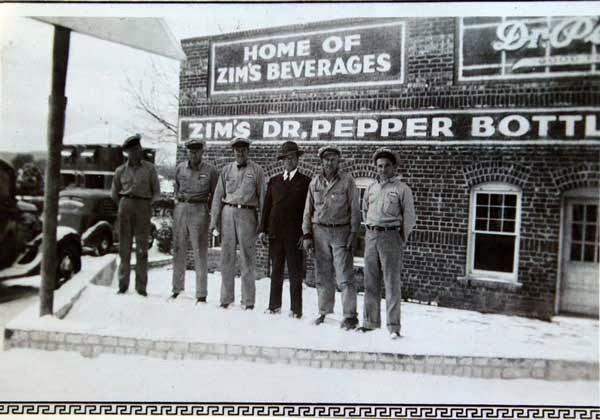Visiting Grant Town Grandparents,
The 1930s Road from Seguin
(This story was written by Louis Scopel,
recalling childhood trips to Grant Town. Grant Town was a “suburb” of Thurber,
located just to the west, northwest. Many structures remain.)
“Travel from Seguin to Mingus was a trip attempted usually
not more than twice a year for reasons mentioned below. The distance was 245
miles on primarily on US 281, usually a highway in good condition. The trip
usually took from five to eight hours depending on stops etc. Most of our trips
were in a 1936 Plymouth
4 door. US 281, was wide enough for two cars and was pretty mundane on most
occasions. Plenty wide as you seldom met another vehicle every thirty minutes,
or at least, so it seemed. Once we left New
Braunfels , the next stop light was in Stephenville.
The 1936 Plymouth
diligently purred along with an under dash radio keeping dad aware of the
latest baseball scores.
We normally left when dad closed
down the poultry processing plant for the weekend and he took a quick bath – he
smelled better then. By then Mom had items packed and ready to go. Mom knew how
long these trips were as she packed plenty of provisions! There was the thermos
of coffee but containers of cookies, several cakes for Gi Gi and John Franks.
And there would be another bag of fruit and sandwiches. She seemed to believe
we might get stranded somewhere sometime. Anyway we would soon be purring along
after leaving civilization in New
Braunfels or so it seemed with our head lights piercing
the darkness. In later years I compared them to two candles!
When traveling in colder weather
our heating system worked great—three of us in the front seat with a blanket
amply dusted with crumbs, tucked across our laps. On one trip, as we approached
Marble Falls Marble
Falls
So we continued and as luck would
have it, there was a Texaco station open, and the young man was accommodating
enough. Yes, they did have a part time mechanic but he had went home for the
week end, however, with a bit of prodding he agreed to come in and look at the
Plymouth’s charging system. We agreed this was better than on the side of the
highway – we had food and a rest room. After arriving, the mechanic determined
it was the generator but questioned where do you locate one at this time of the
night on a weekend? Amazingly our mechanic located one, left and came back with
it under his arm. In short order the generator was ‘ginning’ again and the
lights were comparable to two candles once more.
Our trusty Plymouth would usually
rattle across the cattle guard in Grant Town between 10 and midnight waking everyone and
announcing our arrival – and time to eat and catch up on news. If my aunt Pauline was there, there would be
dishes and bowls of fudge and divinity etc.
{When Thurber shut down many people moved
out to Grant Town. "My mother and grandparents came to Thurber from Noted historian Leo Bielinski has written about Grant Town, and shares:
“Jimmy Grant opened a saloon just outside the city limits
of the Texas & Pacific Coal and Oil Company-owned Thurber. His saloon was
frequented by miners who could talk freely about unionization without fear of
company intimidation. Some immigrant Thurber miners moved out of Thurber to
Grant Town to own homes and small businesses. The area became known as Grant's Town,
shortened to Grant Town.”
"Today it is part of Mingus, but the locals still
refer to it as Grant Town. During Prohibition, there was bootlegging in Grant
Town, and after the repeal of Prohibition in 1933, several honky tonks opened
up.”
"Johnny Biondini, Louis Scopel's uncle, summed
up the family's move from Thurber to Grant Town after the coal mines shut down
in Thurber: 'In Thurber we had all the modern conveniences like running water,
gas heat and electricity. But when we moved to Grant Town, just a quarter mile
away, we had to adjust to coal oil lamps, well water and wood stoves. There are
just a few left who lived in Grant Town before WWII."
“Thurber had a barbed wire fence around it to keep
Thurberites buying in the company store. Jimmy Grant's saloon was just outside
this fence. The immigrant Italians made up a fourth of Thurber's population,
but the company store did not stock the different salamis, cheeses, olive oils
etc. (which the Italians wanted). So in addition to Grant's saloon, there were
several Italians who set up small combination grocery store/saloons in Grant's
Town, just outside of the barbed wire fence to cater to the Italians on Thurber's
nearby Italian Hill: Sealfi, Ronchetti, Mezzano, Corona, Castaldo and Raffaele
[and others].”
"There were several prominent bootleggers in
Grant Town during the Prohibition era. Not just Italians, but all nationalities
were involved in bootlegging. When the mines began shutting down in the 1920s,
bootlegging was a way of surviving and had none of the Chicago style gangsterism. There was little
stigma if you bootlegged. The nearby Ranger Oil Boom was profitable for the
bootleggers."

I love these sorts of stories about life in the small towns that popped up depending on the need. Reading about bootlegging made me smile, as that’s how many Kentuckians in the smaller towns survived during Prohibition.
ReplyDelete